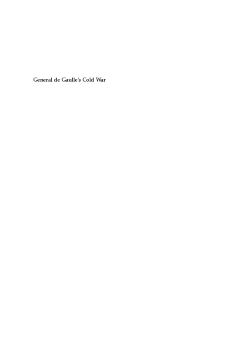
Additional Information
Book Details
Abstract
The greatest threat to the Western alliance in the 1960s did not come from an enemy, but from an ally. France, led by its mercurial leader General Charles de Gaulle, launched a global and comprehensive challenge to the United State’s leadership of the Free World, tackling not only the political but also the military, economic, and monetary spheres. Successive American administrations fretted about de Gaulle, whom they viewed as an irresponsible nationalist at best and a threat to their presence in Europe at worst. Based on extensive international research, this book is an original analysis of France’s ambitious grand strategy during the 1960s and why it eventually failed. De Gaulle’s failed attempt to overcome the Cold War order reveals important insights about why the bipolar international system was able to survive for so long, and why the General’s legacy remains significant to current French foreign policy.
“…a well-written, vibrant presentation of how world events interacted with and impacted de Gaulle's grand design, creating a comprehensive understanding of the general in the Cold War. Highly recommended.” · Choice
“While there is a lot of information for readers to take in, the subject is inherently complex, spanning different aspects of French foreign policy and the politics of other countries and institutions. In spite of this complexity, Martin displays a good grasp of the material.” · H-France Review
“In the end, de Gaulle’s overall aim was to restore France’s status as a great power; but that ship had long sailed; probably as long ago as the 1920s. It was a valiant effort that Martin has documented well in a very readable book—but ultimately one that was doomed to failure.” · Journal of Contemporary European Studies
“[The book] is extremely well researched, well written, and Martin accomplishes his stated objective: namely, to provide a more balanced account of de Gaulle that goes beyond views of him as either a visionary, or an irresponsible and anti-American nationalist…Martin’s analysis makes a unique contribution in that it examines the linkages between the General's economic, political and security policy in order to understand how the three came together to shape his overall policy toward the US.” · Erin Mahan, Chief Historian, Office of the Secretary of Defense
“This is a very detailed, carefully argued and extensively researched study of de Gaulle’s ambition to restore France’s position as a global power during the last half of his presidency under the Fifth Republic by challenging the US claim to leadership of the Western, trans-Atlantic alliance during the Cold War.” · John Kim Munholland, University of Minnesota
“Drawing on very impressive research in document collections and memoirs from France, Great Britain, and the United States, Martin narrates the development, implementation, and rapid decline of de Gaulle’s efforts to assert a new French role in the Cold War… In contrast to the English and French-language scholarship that treats de Gaulle as a strategic hero or an impetuous villain, this book re-examines this seminal figure as a Cold War politician. This is a compelling and very valuable portrait.” · Jeremi Suri, University of Texas at Austin
Garret Joseph Martin is an Editor-at-Large at the European Institute in Washington, DC. He obtained his PhD in International History at the London School of Economics. He co-edited Globalizing de Gaulle: International Perspectives on French Foreign Policies, 1958-1969 (with Christian Nuenlist and Anna Locher, 2011). He currently teaches courses on the Cold War at George Washington University and on transatlantic security at American University.
